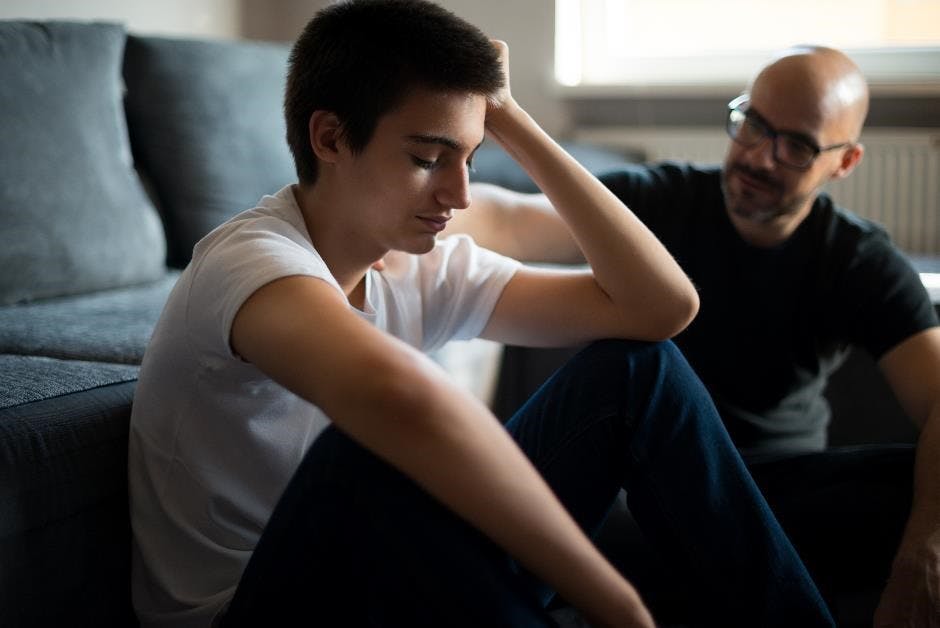How to Manage My Child's Grief When A Sibling Dies From Cancer

It's hard to think about how to support your other children when your world has turned upside down. It’s natural to feel like you don’t have any emotional energy left to give. But your child will look to you for how to cope and need your help managing their grief too.
Tips for managing your child’s grief:
- First, manage your grief
- Understand how your child is grieving
- Help them manage and get support
First, manage your grief
- Often a child's distress mirrors their parent’s. Your child will be looking to you to learn how to get through all these complex emotions they are feeling, probably for the first time. So think about how you can talk about and manage your own feelings. There’s more information about how to do that here.
- One of the best ways you can help your grieving child is to get support for yourself. The better you are coping, the better for them. If they are worried about you being upset, overwhelmed, angry or blaming they will be unwilling to open up and talk to you about how they’re feeling.
- Sometimes children and teenagers start to express their grief more strongly just as you are starting to cope with your own. Call in others to help. Reach out to extended family, friends and your child’s school to make sure your child is well supported.
- If you feel you’re not coping well, talk to a member of your child’s treatment team or social worker at the hospital about getting some professional support. If you’re worried about how to communicate with or support your grieving child you can talk to one of CanTeen’s counsellors: 1800 835 932 or support@canteen.org.au. Many people find it helpful to talk with other people who have lost a child to cancer. You can do that in our online parent community or contact CanTeen to find out about bereavement support services for parents.
Understand how your child is grieving
- Every child and teenager will feel and express grief differently. Yours may be very withdrawn, or have outbursts of anger; some children seem emotionally fine but complain of stomach upsets or have trouble sleeping. Do not underestimate the impact of bereavement, even if a child is very young or does not seem sad.
- How children understand death and experience grief depends on their age, maturity and personality. They can appear to be deeply distressed one moment and fine the next. Often young people work through grief in bearable doses.
- Try to think as your child might be thinking. Cancer Council’s booklet Talking to kids about cancer explains how children and young people understand death at different ages, and what their grief might look like (possible reactions). This can help you work out how to support your child.
Help them manage their grief and get support
- Make sure your child knows people express grief in various ways, and whatever they’re feeling is okay. Children and teenagers need to be reassured that it’s not their fault, that nothing they did or said caused their sibling’s death, and that there is nothing anyone could have done to prevent it.
- Allow your child space to grieve – you can’t (and do not need to) ‘fix’ their sorrow. But you can help them manage it by encouraging them to tell you how they’re feeling, talk about their sibling and cherish their memories. Give them tools to suit their way of grieving. For example, leave out colouring pencils if they like to draw, or take them to the park to kick a ball or a boxing gym for a workout.
- Explain that managing grief and feeling it less over time doesn’t mean “getting over” their sibling’s death or “moving on” – it’s finding ways to live with their loss.
- Difficult as it is right now, try to maintain some sense of ‘normal’. It helps your child cope if they keep up school/Uni/work and their usual activities.
- Encourage your child to talk to you, but also suggest they think about who else they can talk to and get support from. This could be other relatives, family friends or a school counsellor.
- Suggest they think about talking to a counsellor – someone who is outside the family, so they can be totally honest without worrying about upsetting them, and who is skilled in helping people cope with anger, sadness and fear. CanTeen has a free counselling service just for young people whose sibling or parent has died from cancer: call 1800 835 932 or email support@canteen.org.au to find out more.
More advice/support
> CanTeen’s counsellors can provide bereavement support tailored for young people: 1800 835 932 or canteen.org.au
> Join our online parent community to read how other parents have supported their grieving child.
Useful sites/resources
> CanTeen’s e-book for young people Living with the death of your parent or sibling from cancer
> See Useful links for other organisations that provide bereavement support for adults and children
